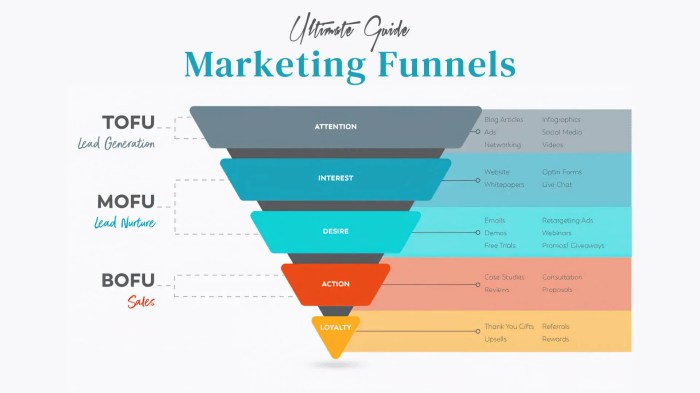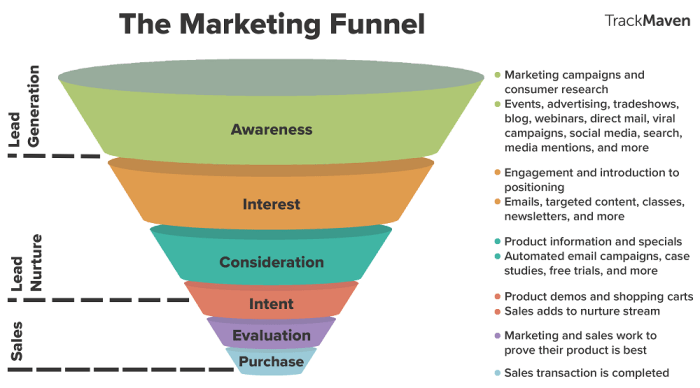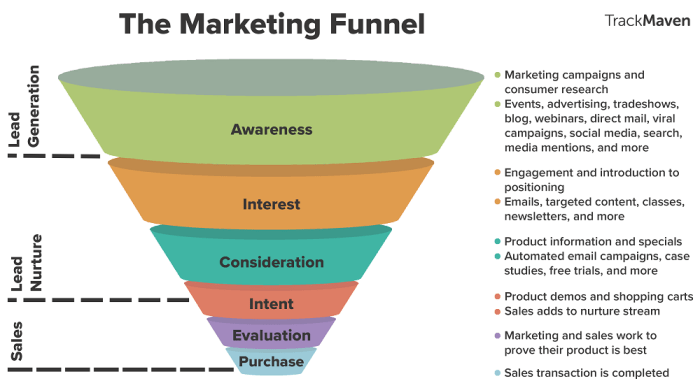Understanding Marketing Funnels sets the stage for a journey through the intricate world of sales and lead generation, offering insights that can revolutionize your marketing strategies.
From breaking down the core concepts to exploring real-world examples, this guide will equip you with the knowledge needed to master the art of funnel optimization.
Understanding Marketing Funnels

In the world of marketing, a marketing funnel is a strategic approach that Artikels the journey a potential customer takes from being aware of a product or service to making a purchase. It is called a “funnel” because, like a funnel, the process starts broad and then narrows down as prospects move through different stages.
Explaining Marketing Funnels
- Top of the Funnel (TOFU): This is the awareness stage where potential customers first learn about your brand or product through various marketing channels such as social media, blogs, or ads.
- Middle of the Funnel (MOFU): In this consideration stage, prospects have shown interest and are evaluating your offerings. They might sign up for a webinar, download a whitepaper, or engage with your content.
- Bottom of the Funnel (BOFU): The decision stage where leads are ready to make a purchase. They might request a demo, engage with a sales representative, or add items to their cart.
Importance of Data Tracking
Tracking and analyzing data at each stage of the marketing funnel is crucial for optimizing your strategies and improving conversion rates. By monitoring key metrics such as traffic sources, click-through rates, conversion rates, and customer behavior, you can identify areas of improvement and make data-driven decisions to enhance your marketing efforts.
Types of Marketing Funnels: Understanding Marketing Funnels

In the world of marketing, different types of funnels serve various purposes, catering to the unique needs of businesses and their target audiences.
Sales Funnels
Sales funnels are designed to guide potential customers through the purchasing process, from awareness to making a purchase. These funnels often include stages like awareness, interest, decision, and action. Sales funnels are commonly used in industries such as e-commerce, software, and retail.
Lead Generation Funnels
Lead generation funnels focus on capturing potential customers’ contact information, allowing businesses to nurture relationships and convert leads into sales. These funnels typically involve stages like attracting leads, capturing their information, and engaging with them through targeted marketing efforts. Lead generation funnels are prevalent in industries such as real estate, insurance, and consulting.
Conversion Funnels
Conversion funnels concentrate on optimizing the process of converting leads or prospects into paying customers. These funnels aim to reduce friction in the buying journey and increase conversion rates. Conversion funnels are often used in industries like SaaS (Software as a Service), digital marketing, and online education.
Creating an Effective Marketing Funnel
To design a successful marketing funnel, there are several key steps to follow. From attracting potential customers to converting them into loyal buyers, each stage plays a crucial role in the overall success of the funnel.
Role of Compelling Content
Compelling content is essential in attracting and retaining potential customers within the marketing funnel. By creating engaging and valuable content, you can capture the interest of your target audience and keep them engaged throughout the buyer’s journey.
- Develop a content strategy that aligns with your target market’s needs and interests.
- Create high-quality and relevant content that provides value to your audience.
- Utilize various content formats such as blog posts, videos, infographics, and social media posts to appeal to different preferences.
- Personalize content to address the specific pain points and challenges of your potential customers.
Optimizing for Higher Conversion Rates, Understanding Marketing Funnels
Optimizing a marketing funnel is crucial for improving conversion rates and maximizing the impact of your efforts. By analyzing data, testing different strategies, and making adjustments based on insights, you can enhance the overall performance of your funnel.
- Use A/B testing to experiment with different elements of the funnel, such as CTAs, landing pages, and email content.
- Track and analyze key metrics to identify areas for improvement and optimize the funnel accordingly.
- Implement marketing automation tools to streamline processes and nurture leads more effectively.
- Continuously monitor and refine the funnel to ensure it remains effective and drives results.
Tools and Technologies for Marketing Funnels
In the world of marketing funnels, having the right tools and technologies can make all the difference in creating successful campaigns. Let’s explore some popular options and how they can help businesses build and manage effective marketing funnels.
Popular Tools for Building and Managing Marketing Funnels
- ClickFunnels: Known for its easy-to-use drag-and-drop interface, ClickFunnels allows users to create landing pages, sales pages, and complete sales funnels quickly.
- Leadpages: Another popular tool for building landing pages and lead generation funnels, Leadpages offers a variety of templates and customization options.
- Unbounce: With a focus on A/B testing and conversion optimization, Unbounce is a great choice for creating high-converting landing pages.
Comparison of Software Options for Automated Marketing Funnels
- HubSpot: Offers a comprehensive suite of tools for inbound marketing, including automated email marketing and lead nurturing.
- Infusionsoft: Known for its CRM and marketing automation capabilities, Infusionsoft helps businesses manage leads and automate follow-up processes.
- ActiveCampaign: A popular choice for small businesses, ActiveCampaign provides advanced marketing automation features at an affordable price point.
Integrating CRM Systems with Marketing Funnels
- CRM systems like Salesforce, Zoho CRM, and HubSpot CRM can be integrated with marketing funnels to improve customer experience and streamline communication.
- By syncing customer data between CRM systems and marketing funnels, businesses can personalize their marketing efforts and provide a seamless experience across all touchpoints.
- Automating lead scoring and nurturing processes through CRM integration can help businesses identify high-value leads and move them through the sales funnel more effectively.
